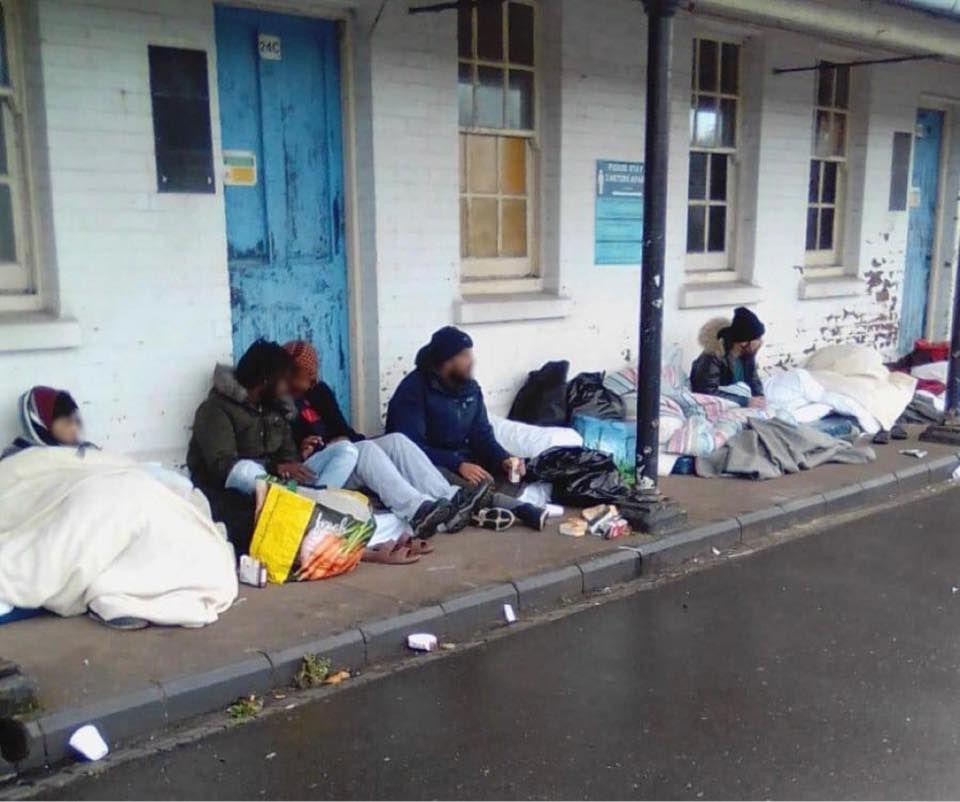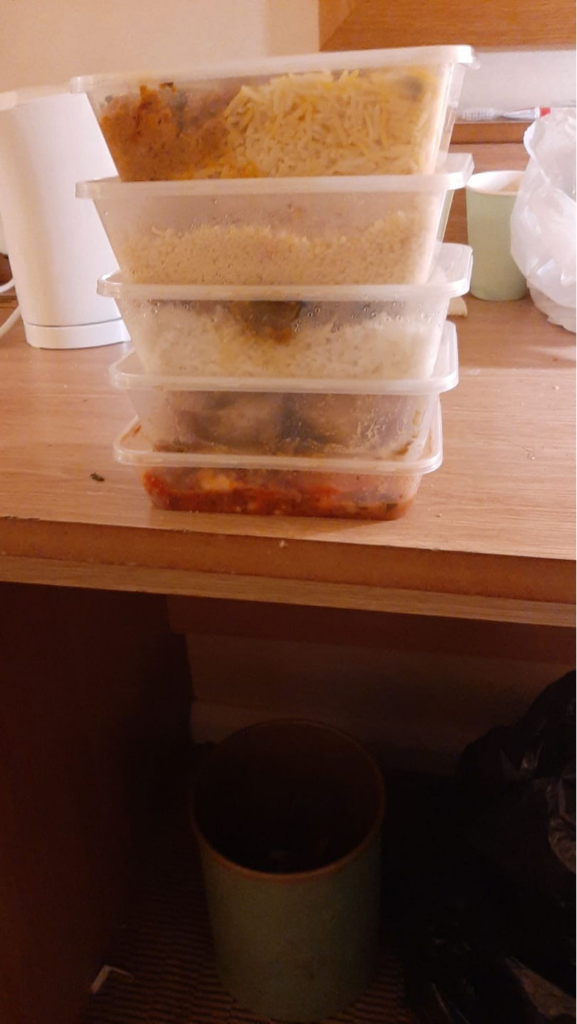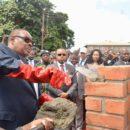
Debating Ideas is a new section that aims to reflect the values and editorial ethos of the African Arguments book series, publishing engaged, often radical, scholarship, original and activist writing from within the African continent and beyond. It will offer debates and engagements, contexts and controversies, and reviews and responses flowing from the African Arguments books.

Asylum seekers protest at Napier barracks. Photo credit: BBC
In September 2020, I met a group of Sudanese asylum seekers in a hotel in London. I had just started volunteering as part of the Sudan New Arrivals Volunteer Support Group (hosted by Waging Peace) and for Care4Calais. I was dropping off some clothes at a hotel, when I saw a number of young Sudanese men sitting in the car park – moving around so they could catch the sun. It was like being back in my office courtyard in Darfur (in the days before the conflict), and I think we were equally happy to see each other. The few words in Arabic I knew and knowledge of the places they had come from made them feel welcome, I hope, and I was happy to meet people from Sudan. Eight months later, they were transferred without any prior notice to towns and villages in Yorkshire and Newcastle. Over the eight months, more Sudanese people arrived; some were taken to military barracks in Penally or Napier, some to Immigation Removal Centres and then released. In 2020, while overall numbers of asylum applications in the UK declined, those by Sudanese increased by 34%.
Through my support and – later – friendship with them, I learnt first-hand about their experience of the UK asylum system, not only its blatant human rights abuses but also the everyday cruelties that have become part of the hostile environment. Building on my earlier research on Darfuri migration from Sudan to Europe, in this post, I explore these everyday seemingly small and often thoughtless acts that make life difficult.
Numerous small acts that make getting asylum difficult
In my research, I found that Sudanese people who claim asylum in the UK have fled violence, conflict and persecution, and that most have experience of being trafficked and exploited in Libya. They also experience violence and a policy-induced humanitarian crisis when moving through Europe. What makes Sudanese individuals particularly vulnerable is that they are amongst the most economically disadvantaged people on the move in Europe, often with limited education or language skills (some do not read or write Arabic let alone English), despite their close connection with the UK (colonial ties, relatives, friends). The switch to remote or online services during the Covid-19 pandemic has amplified their difficulties. Years of surveillance by Sudan’s security services makes most Sudanese extremely reluctant to communicate by phone with someone they do not know. The experience of Sudanese asylum seekers shows just how difficult a safe and dignified life becomes, when access to lawyers, food, health care, education and to other people is restricted.
In contrast to forced return or mass detention, numerous small acts (or regimes of micro-practices) to make the life of asylum seekers difficult are less visible (and draw less attention from activists) but can be just as damaging. Their combined effect builds up over time contributing to a politics of exhaustion, intended to grind down people’s resolve to claim asylum and to make volunteers and refugee support professionals burn out and give up. As such, it can be seen as part of the hostile environment.
For those I met, the cruelties started immediately upon arrival in the UK and continue on a daily basis. The first thing that happened was the confiscation of their mobile phones by the UK Border Force, ostensibly to check for evidence of criminal activity. Asylum seekers were then given a phone number and email address, with instructions in English on how to get their phone back. Clearly this is difficult without a phone or being able to read or speak English. Even if they managed to make this call, I was told, there was usually no answer or they were disconnected. On arrival, the Home Office also administers the Initial Contact and Asylum Registration questionnaire, but often failed to ask about the journey to the UK which identifies the possibility of having been a victim of modern slavery, or trafficked, in Libya. Victims of modern slavery are entitled to additional protection and while this was assessed, they were protected from deportation under the EU’s Dublin III Regulations (to a country they had passed through). Young people (under 18), who are also legally entitled to additional protection, often have their age disputed by the Border Force. To prove their age, they later have to undergo gruelling and repeated interrogations. If judged to be an adult their care can suddenly be stopped (and in one case, literally dropped in the street in front of the Home Office).
‘Emergency measures’ limit access to services
Asylum seekers have been housed temporarily in hotels as part of the Home Office’s emergency measure during the pandemic. When there, their immediate needs are shoes, clothes, phone; but none are provided by the UK authorities. Those, like most Sudanese asylum seekers, who travel to the UK on small boat crossings, are not allowed to take possessions and what they do take is destroyed by seawater. Phones are essential for accessing a lawyer to assist with their asylum claim as contact is remote. Even with help from volunteers this can be very difficult without the language skills or access to the required technology.
Immigration lawyers require a signed letter of authorisation to take on a case. For those who cannot read or write their name, date of birth or nationality in English, this is the first hurdle. Next the lawyer takes a statement, and sometimes sends it back – in English – to check and make corrections. Access to a scanner or to an envelope and stamp is assumed but by no means guaranteed. In addition, some lawyers only provide landline numbers but most of those asylum seekers I know rely on WhatsApp so they can use Google translate. Often they do not have phone credit. Even if they did it would require good language skills and stamina to get past some lawyers reception or automated answering systems. Most of my Sudanese friends have never contacted their lawyer directly. This process is endlessly repeated with letters from the Home Office, GP appointments, and registering for English lessons. Who knows how many fall through the cracks – having no charity or refugee support workers to assist, money to buy phones or language skills to call – or what the consequences are.
The necessity of smartphones, and the cruelty of removing them, is even more striking when people are taken into Immigration Removal Centres, as a number of the Sudanese I know were. They were taken early in the morning, without notice and apparently quite randomly, thus, instilling fear in all the others. Upon arrival their smartphone was exchanged with a basic mobile phone with no internet access; curtailing the possibility of communication with the outside world, making it extremely difficult to provide information on the need to get detention lawyers or get information about their cases. With a lot of effort from lawyers and volunteers, my friends got out. Others were not so lucky and were deported. When released, none of those I know were taken back to the same hotel where they already knew people and might have built some support.
Less visible, insidious, cruelties
Being left in a hotel for months without information, no possibility to cook for yourself and no money, is one of the less visible cruelties of the current system. People struggle with the lack of information on what is going to happen next. Sudden announcements that the Home Office would visit were alarming. Home Office visits could be good, like the first time subsistence payments were made (in late November), or when some were moved to self-catering accommodation nearby, or bad, if taken to Immigration Removal Centres or to the army barracks. The people I know were moved to the army barracks in the middle of the night. Even access to food can be problematic. As has been widely reported the food provided in these hotels is inadequate in quality and quantity (particularly for teenagers and young men as many Sudanese are). Not being able to prepare your own food for eight months is deeply dehumanising. It was only in December that they received a debit payment card for £8/week to meet additional needs. Being able to prepare and eat your own food is essential for a sense of equality, dignity, identity and culture. My friends would often not eat: when I asked for pictures of their breakfast, lunch and dinner, they immediately sent me pictures of all three left in their room – uneaten. In contrast, I had never seen them look so happy as when the local British/Sudanese community provided food to break fast during Ramadan.

Re-traumatisation and self-harm
Being stuck in a hotel room for months, or worse, in the army barracks of Napier and Penally can lead to re-traumatisation, especially for those who grew up in a displaced camp under constant surveillance and harassment from government and militia, and who were victims of modern slavery in Libya. Some suffered flashbacks when held captive in barracks or in hotels. Lack of information for prolonged periods for traumatised young people creates tensions, night terrors and in some cases outright psychosis. Suicide attempts in the barracks were frequent. The shock of not having their human rights respected in a country on which they pinned all their hopes on is sometimes too much to take. Telling, and reliving, their stories and experiences to prove they were victims of trafficking to get out of the army barracks or to prevent deportation is further traumatising. In June 2021, detention in the barracks was judged unlawful in light of the health risks it posed in a pandemic.
While Penally was closed, and many people have been released from Napier, some asylum seekers continue to be housed in Napier, and the UK government stated that it thinks providing better accommodation would undermine confidence in the asylum system. Protests or talking to the media have been discouraged with claims that this would affect their asylum applications. Some went on hunger strike and others slept outside in protest against living conditions and the risk of contracting coronavirus – as many later did. The fire at Napier can be seen as a result of the horrendous conditions experienced by asylum seekers.
Staff in hotels, charity workers and lawyers struggle to change this situation; access to psychiatric care is difficult, and volunteers and hotel staff are often untrained to deal with these traumas. In addition, asylum seekers now face the impossible dilemma of having to decide whether to go through the mechanism to be accepted as victims of modern slavery and receive additional protection, but in doing so risk delaying their asylum claim. Providing some social contact, through drop-in centres (when there is no lockdown), football, and going for walks in nearby parks is often all that is possible.
The cruelties of isolation
Social contact has, however, been limited even in the hotels. At times of complete lockdown, volunteer visits to the hotel were only possible to drop things off (e.g. clothes, phones). Sometimes I had to distribute outside even in mid-winter. Even when lockdown eased, frequent changes in the staff of the companies managing the hotel meant constantly changing rules about what is allowed and what is not. In the past eight months, I have only rarely been able to just sit and chat. Social contact between Sudanese has also been made difficult during the pandemic, as they were told they could not visit each other in their rooms and had to adhere to social distancing rules when elsewhere in the hotel. For Sudanese to stay and eat alone is also very undermining of their identity, culture and religion, for example during Ramadan.
Now that most of my new Sudanese friends are in Home Office managed houses in the north of England, they seem relieved because at least something has happened (and it’s not deportation). But they face new obstacles for social contact, communication, and subsistence. Everyone has been separated – some are in different houses in the same city but most are in different cities far apart. This separation means that most no longer have access to the few English speakers amongst them for translation. Internet access (Wifi) is not provided, which once again makes it difficult to communicate (no WhatsApp or Google translate), continue online English classes, get health care or contact lawyers, or register for college in the new place. While individuals do keep in touch, they have lost face-to-face contact with the friends and support network they had in London. The £39.63/week they receive now for subsistence does not cover the transport needed to meet up, or Wifi, as well as other basic needs. And most recently, people have not even been receiving this money as the Home Office has recently changed the company providing the debit payment cards. However, when their old card stopped working on 21 May, many were left without access to cash for weeks because they had not received the new card. Some received emergency payments but others did not, thus potentially going hungry or leaving them dependent on food banks, charities or the kindness of volunteers.
The cruelties outlined here are only a fraction of those faced by asylum seekers in the UK. Much more can be written and no doubt much more is to come. It is up to all of us as volunteers, charity workers, researchers and citizens to keep resisting and protesting these cruelties until they end.
*This piece was first published on the Oxford Law Border Criminologies Blog.





